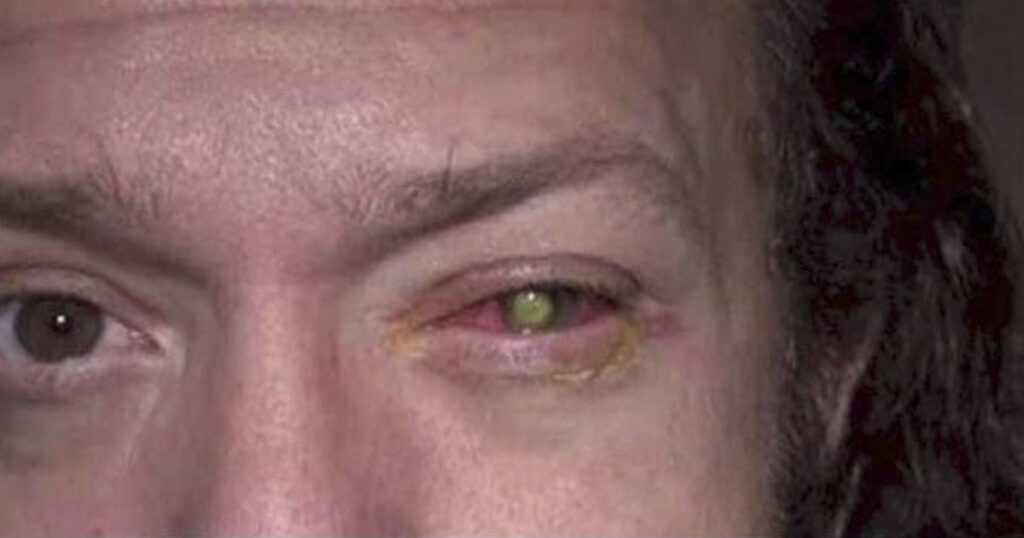Chad Groeschen experienced the worst fear of any contact lens wearer in 2015 firsthand. He lost vision in one eye after dozing off while wearing lenses. He started wearing contacts when he was 18 and was 39 years old at the time.
But he had started using extended day and night lenses a year earlier. Before he woke up with his eyesight “clouded over,” Groeschen had no idea that sleeping with contacts in had hurt his eyes.
According to Groeschen’s medical professionals, wearing contacts while sleeping caused him to get a serious bacterial infection in his eye. His cornea was damaged by the illness. “For about three weeks, it was almost like an 8-inch nail being driven into my face, my eye,” said Groeschen. “Literally there was no escaping. Looking at a light hurt.”

Groeschen’s infected eye has only 20% of its original vision left after this encounter, although he is still able to see light and colour. He might eventually require a cornea transplant, but his doctors think things could have turned out much worse.
“I had no idea something like this could happen so fast,” Groeschen said. “I feel very fortunate that I was able to get in here as soon as I did, because I do believe they saved my eye.”
“Twenty thousand patients a year develop a pseudomonas infection in the United States,” said ophthalmologist Dr. William Faulkner. “If it’s left untreated, it can actually cause a person to completely lose the eye.” There are different ways to contract eye infections but sleeping in lenses is one of them.
In fact, when it comes to pseudomonas infections, the risk is “over 10 times greater for patients who sleep with their lenses,” according to Dr. Faulkner. The risk still applies for contacts intended for extended use, as exemplified by Groeschen.
What Happens While Sleeping With Contacts In
Every day, microorganisms come into touch with the eyes without infecting them. This is so that the cornea, which shields the eye from foreign objects, can operate effectively. However, it requires sufficient hydration and oxygen. Blinking seals in moisture while tears take in oxygen during the day.
The cornea is covered by contact lenses, which restricts its availability to moisture and oxygen. However, during sleep, that drop worsens and the corneal cells are unable to fight off bacteria because of the reduced oxygen levels. Furthermore, the lens could amass bacteria and debris during the day, increasing the risk of infection.
“Any time you choose to sleep in a contact lens, whether it’s approved for continuous or extended wear, you put yourself at greater risk for a contact-lens-related complication,” said Samuel D. Pierce, OD, an optometrist based in Alabama and former president of the American Optometric Association (AOA). “Just because the material is porous enough to allow enough oxygen doesn’t mean that [sleeping in them] is the best thing to do. You have no idea what that contact lens has come into contact with, which would be spending the night in your eye.”
A situation like Groeschen’s happened in 2019. Having slept with her contact lenses in, a woman in North Carolina woke up with itchy eyes. When she went to her neighbourhood urgent care, the doctor there gave her a tiny pseudomonas ulcer diagnosis. After receiving antibiotics, she developed an enlarged ulcer and woke up the following morning blind in that eye.
From the time she first noticed symptoms until she saw Patrick Vollmer, OD, of Vita Eye Clinic in Shelby, NC, this infection had eaten away at her cornea and seriously harmed her vision. He subsequently posted about the incident on Facebook, advising others to take their contact lenses out before night. Although medication started to help the woman’s eye, Vollmer anticipated that she would eventually experience some kind of residual visual loss.
“‘I sleep in my contacts all the time and I’ve never had a problem,’” he began his now-viral post. “As an eye doctor, I literally hear this daily.” He went to state that he doesn’t recommend sleeping in any brand of soft contact lenses. “The risks outweigh the benefits every time. It takes seconds to remove your contacts but a potential lifetime of irreversible damage if you choose to leave them in.”
He wanted to spread awareness of these easily treatable infections, especially because many people opt to sleep with their contact lenses in because they believe they will never experience this problem. “The odds of infection are much better than playing the lottery,” Vollmer said. “I don’t know why you’d gamble with your eyesight.”
How to Care for Eyes and Contact Lenses
Remove your contacts right away if you unintentionally wear them while you sleep. Don’t push your eyes to open if they are too dry to do so. Before attempting again, lubricate your eyes with a sterile contact solution.
For the following 24 hours, refrain from using contacts once more and pay attention to how your eyes feel. Consult an eye doctor right away if you develop impaired vision, heavy watering, discharge, or redness. For an infection test, bring your contact lenses in a plastic bag.
The American Academy of Ophthalmology advises the following to keep contacts — and thereby the eyes — clean and healthy.
Don’t swim or wade in a hot tub wearing contacts.
Wash your hands with soap and water before handling the lenses.
Use contact lens solution (never water or saline solution) to rinse and store the lenses.
Replace the solution in the lens containers every day. Don’t just “top it off”.
Replace your lens case at least every three months, or when the current case becomes broken.